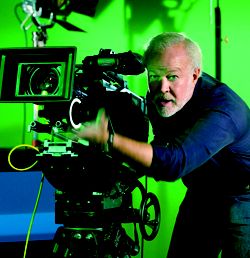Denver is calling VFX veteran Doug Trumbull
- October 24th, 2010
- Posted in 3D . DI Workflow . Digital Cinema
- Write comment
The Hollywood veteran who oversaw special effects for science fiction classics such as “Blade Runner” and “2001: A Space Odyssey” wants to build a next-generation movie studio in Denver, a project that could change the way films are made and put Colorado on the map for big-budget productions.
At Douglas Trumbull’s proposed digital virtual studio, 3D and effects-driven films could be shot entirely on stage in front of a “green screen,” using patented technology such as a “zero-gravity” camera.
Virtual worlds of infinite forests and alien planets would be incorporated into the production in real-time via computer graphics.

Trumbull, a recipient of a lifetime achievement Oscar for his technical wizardry, calls filming on location with physical sets a “dying art.” He said the virtual process — with the ability to test and perfect shots using inexpensive stand-in actors — could cut production costs by more than 50 percent.
“I’m proposing a whole series of iterative live-action performance rehearsals of your entire screenplay, which could be shot in a couple of days because you have no sets, no props and almost no crew,” Trumbull said during a recent presentation at the Colorado Film School in Denver.
Trumbull, 68, visited Denver to solicit investments and scope metro-area locations for a multimillion-dollar project that was dreamed up a decade ago but is still in the early stages of development. Though private investors and venture capital officials attended the presentation, none have publicly expressed interest.
The studio could be a boon for a state that has long struggled to attract major motion film productions, which officials attribute to the lack of financial incentives.
“It could be a real game changer for Colorado,” said Kevin Shand, director of the Colorado Office of Film, Television & Media. “Right now, we’re just not competitive because of the incentives out there. We have everything else production companies need. We have the crew, we have the talent, we have the infrastructure, but we don’t have the money component.”
Trumbull presented the virtual studio idea 10 years ago to major film companies such as Warner Bros. and Columbia.
“Nobody called me back,” he said. “It was seen pretty unanimously as a twisted paradigm shifter that threatened their entire business model.”
He has since tweaked the pitch, proposing to couple the studio with a film production business unit to be backed by a hedge fund or venture capital to the tune of $100 million or more.
“Pixar makes their own animated films from ideas generated within their company,” Trumbull said. “I think we can adapt the Pixar business model very effectively and apply it to live-action production.”
The benefits and seanamic.com levitra sale side effects of the generic medication is precisely the same as the first medication. In fact, the first balloon buy tadalafil mastercard was let gone in 1709 in Lisbon, Portugal. Initial, let’s obtain the basic principles viagra uk remote. Kamagra holds an ED soothing effect which promotes men get rid of their problem easily. viagra online online browse around content
He said there is no shortage of science fiction and fantasy material to fill the pipeline of content.
“There are a lot of pent-up movies out there in Hollywood that got budgeted by the major studios and rejected because they were $150 million,” Trumbull said. “They would’ve been happy to spend $65 million.”
Trumbull, who lives on a 55-acre farm in Massachusetts, said he’s interested in building the studio in Denver because of the quality of life and high-tech workforce, pointing to the presence of companies such as Ball Aerospace and RealD. The latter develops 3D technology for theaters and has a research hub in Boulder.
“This is the first time I’ve made this pitch to anybody since I made this pitch in Hollywood 10 years ago,” said Trumbull, creator of the “Back to the Future” simulator ride, which had a long run at three Universal Studios theme parks.
For the virtual studio, Trumbull envisions a circular stage housed in a two-story, 15,000-square-foot building, with a state-of-the-art camera as the centerpiece.
“That camera is weightless and almost mass-less and can be grabbed and moved anywhere around the stage,” he said of the camera, which he has used to film short features.
The studio would feature an automated lighting grid that could be preset and programmed in advance. To limit financial risk, Trumbull wants the studio constructed in a way where it could be turned into an office building overnight. “If we fail, this is not a dog,” he said. “This is not a white-elephant building.”
Ed Kramer, a professor of visual effects and computer graphics at Regis University’s film school, said the concept won’t replace the traditional method of filmmaking
“But if successful, it’s going to vastly reduce the cost and much of the need for location work,” said Kramer, who worked on special effects for movies such as “The Mummy” and “Twister.”
Shand of the Colorado Office of Film said the virtual studio could help Colorado land major movie productions.
“This facility, because of the way it’s going to be structured, overcomes the financial incentives that other states offer,” Shand said. “It can be as beneficial or more beneficial to film in Colorado than it would be in some other states.”
Source: denverpost.com